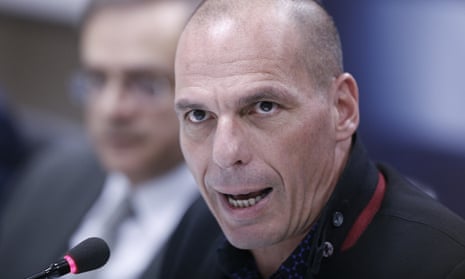Following the formation of the new Greek government we are entering a period of negotiation. This is good news, and overdue given the scale of the social and economic crisis in Greece. The new prime minister, Alexis Tsipras, has announced that he will not unilaterally walk away from Greek obligations but seek dialogue with creditor countries. He has a clear mandate for change, but it is also important to bear in mind the constraints on the other side of the negotiation table.
Angela Merkel’s coalition government in Germany also operates within clear political limits, partly because a faulty narrative about the origins of the eurozone crisis has been circulating in Germany for half a decade. This is very unfortunate but makes a full U-turn on Greece unlikely. The anti-euro AfD – Alternative for Germany – has been gaining political support since the European elections last May, and is now trying to use the anti-Islam Pegida protests in some parts of the country to further draw disaffected citizens into its orbit. These are new phenomena in German politics and help to explain – though not excuse – the stubbornness with which misguided policies have been pursued. As in other countries, the German political elites are afraid of losing traction in society and have become excessively cautious as a result.
But there is light at the end of tunnel. The opposing parties might be at loggerheads at the moment but there is scope for a political deal that would allow both sides to keep their integrity. Here are the three things that need to come together.
Introduce a moritorium on debt
First of all, the issue of the inherited Greek debt stock needs to be addressed. The key point of Syriza is that a haircut of 50% would free up a large part of the country’s primary surplus and thus allow for new spending to address the worst social problems and kickstart growth. The debt haircut is thus a means to an end.
For creditor countries it is important to show to their electorates that they are not giving in to pressure to write down loans. This is a question of principle. The solution to this confrontation is a moratorium on debt payments, further adjusting interest rates and maturities, and linking future repayments to economic growth. This would allow both sides to claim victory: Germany and other creditor nations would not suffer a debt write-down, and the Greek government would free up funds to spend on its policy priorities.
Abandon austerity, and tackle corruption
The second element is kickstarting growth and pursuing domestic reform in Greece. Several of Syriza’s own policy priorities are aimed at generating growth, and these domestic efforts should be accompanied by a reversal of the Troika’s austerity conditionality. There is overwhelming evidence that austerity has been a disaster. Admitting this and changing course will show Syriza that creditor countries are willing to turn the page.
But Syriza too has to learn from past mistakes. The new Greek finance minster, Yanis Varoufakis, has promised to destroy the foundations of the Greek oligarchy. Tackling corruption and reforming the tax system, the civil service and other dysfunctional institutions will not be easy. But it is a vital necessity for Greece itself, and to show to creditor countries that the new government is serious about reform at home.
Boost the rest of the eurozone
The third element of a possible deal is creating the European environment in which this can work. It is obvious that if you want to deal with sluggish growth and large debt burdens, a deflationary economic environment is the last thing you want. The eurozone needs to get its inflation rate back to the 2% target as quickly as possible, which would help reduce the real value of debt. Entrenched deflation does the opposite, and would create problems not just for Greece, but also for other countries with a high debt-to-GDP ratio.
The European Central Bank has, eventually, done its part by starting quantitative easing. But as Mario Draghi, the ECB president, said, QE alone will not be enough. We need a concerted investment push across the eurozone that takes advantage of the new money and record low interest rates. If you don’t invest now, when would you ever do?
The European commission could also provide an extra boost for Greece and other crisis-stricken countries by making sure that the bulk of its announced investment programme goes to where it is needed most.
Together, all these elements would put Greece back on to a growth path. If this is achieved, there is no reason why Greece could not service its debt once the moratorium runs out. It will be a significantly lower burden as the economy will have recovered by then.
The deal sketched out above would allow all parties to keep face. Germany and other creditor countries would not accept a haircut, but they would be flexible about repayment terms and about changing policy conditionality. The Syriza-led government, on the other hand, would be in a position to tackle Greece’s social and economic crisis, but would have to accept that its debt is not going to be written off. All eurozone countries, together with the European institutions, would make sure that they do not sink into a Japanese-style deflation. This is in everyone’s interest.
To sum up, there is a way forward if everybody negotiates in good faith – but the stakes are very high. The danger of political accidents is clearly there. But a messy default and potential break-up of the currency union is in nobody’s interest. So in the end a compromise is the most likely outcome.
